BLOG
Greek Innovation Looking Ahead: Tapping the Power of Diaspora, Education & AI | Delphi Economic Forum X
By Endeavor Greece
May 12, 2025

At Delphi Economic Forum 2025, Endeavor Greece curated a high-level discussion that asked a timely, and urgent, question: What will it take for Greece to unlock its next wave of innovation?
Moderated by Panagiotis Karampinis, Managing Director of Endeavor Greece, the panel brought together global minds from academia, government, and policy:
Maira Myrogianni, Secretary General for Greeks Abroad & Public Diplomacy, Ministry of Foreign Affairs
Michael G. Jacobides, Sir Donald Gordon Professor of Entrepreneurship & Innovation and Professor of Strategy, London Business School.
Petros Koumoutsakos, HIAS Chair & Professor of Computing in Engineering & Sciences, Harvard University, USA
Stefanos Gandolfo, Director of Columbia Global Center, Athens
The Diaspora: Not Just a Brain Drain - But a Global Network
One of the panel’s central themes was the opportunity that lies in activating Greece’s extensive diaspora - not simply asking for their return, but inviting their deeper engagement.
As Panagiotis Karampinis pointed out, Greek-founded startups within the country are valued at approximately €12 billion. In comparison, startups founded abroad by members of the Greek diaspora are estimated at over €150 billion - a tenfold difference.
Maira Myrogianni emphasized the untapped potential of this network: professors, researchers, scientists, and business leaders who are eager to contribute - if we create the channels to connect them meaningfully. The Ministry’s work to map the diaspora and support academic chairs abroad is just the beginning.
Michael Jacobides expanded the conversation by challenging the terms “brain drain” and “brain gain,” arguing instead for a model of fluid, values-based engagement: “We don’t need everyone to return. We need open systems that let people come, contribute, and connect - without requiring full reintegration.”
Petros Koumoutsakos added that it's not just about Greeks abroad supporting Greece - it's about building bridges, not borders. "We have networks, access to research funding, and strategic relationships worldwide. Let’s use them."
Education: A Foundation That Needs Flexibility
The second half of the discussion turned to education - both as a pillar of national progress and a tool for integrating talent from abroad.
Panelists acknowledged the progress being made in the Greek education system - greater openness, growing international cooperation, and signs of reform - but also highlighted barriers: bureaucracy, underfunding, and rigid structures that limit innovation.
Stefanos Gandolfo shared the idea that Greek public universities could, and should, evolve into regional hubs for research and innovation. “But they need freedom,” he noted, “not everything can be decided by what is ‘defined in the law.’”
The room aligned around the need for mobility, collaboration with international institutions, and the modernization of administrative models - not just for today’s challenges, but for tomorrow’s technologies.
Technology & AI: From Research to Real Impact
The conversation naturally led to artificial intelligence - and how Greece can participate in shaping its future, not just react to it.
Michael Jacobides urged attendees to move beyond buzzwords and think critically about how AI can be embedded in productive systems: “The real opportunity lies in rethinking our processes to deliver more value - and that requires both vision and coordination.”
Petros Koumoutsakos added that AI can (and should) solve real-world problems in Greece - from natural disasters to smart resource management. But that requires infrastructure, research funding, and stronger links between applied science and policy.
What’s Next: Urgency Meets Opportunity
As Panagiotis Karampinis closed the session, one message stood out: Greece’s innovation ecosystem is at an inflection point. The next phase won’t emerge on its own. It will take coordinated action - between government, academia, the private sector, and the diaspora.
And it will take trust: that those working abroad want to contribute; that our institutions can evolve; and that innovation doesn’t just happen in labs - it happens when ideas, people, and systems align.
People Involved :

Panagiotis Karampinis